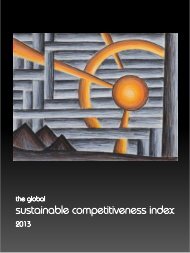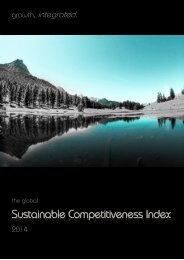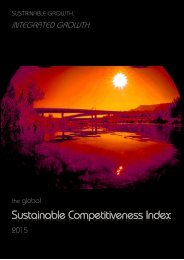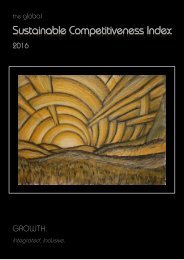Global Competetiveness Report
Create successful ePaper yourself
Turn your PDF publications into a flip-book with our unique Google optimized e-Paper software.
Limitations of Quantitative Data<br />
Methodology<br />
Data Sources<br />
Only data from reliable sources was included in the index. Most data points and data series<br />
were extracted from the World Banks statistical database as well as from the combined UN<br />
database that contains statistical data across several UN agencies.<br />
Data reliability & accuracy<br />
The data sources (World Bank, UN agencies) are considered reliable and unbiased. Raw<br />
data from the various databases was used as a basis for calculation as-is, i.e. without verifying<br />
the actual data.<br />
Limitations of quantitative analysis<br />
In order to exclude subjectivity, only quantitative data has been taken into account.<br />
However, quantitative indicators sometimes are not able to differentiate or express real and<br />
actual levels of quality. High spending on health care for example does not necessarily<br />
guarantee high quality health care system available for the average citizen. Equally, the<br />
percentage of school enrollment(on all levels, form primary levels to college and universities) is<br />
not necessarily an expression of the quality of the education. However, for some indicators,<br />
quality is equally important to quantity from a sustainability viewpoint. For such indicators,<br />
quantitative indicators have limited informative value and serve as a proxy.<br />
While explanatory power of quantitative indicators is limited, conducting a qualitative<br />
evaluation of the 69 indicators used on the global level would go far beyond the limitations of<br />
this index. For indicators with a potentially low correlation between quantity and quality, the<br />
weighting has been adjusted accordingly.<br />
Timeliness of data<br />
Data for 2011 is not yet available for most indicators from the databases used for this index.<br />
Most data used for this index date from 2010. Where 2010 data was not available, 2009 data,<br />
and in some cases, 2008 data has been used.<br />
Availability of data<br />
For some indicators data is not available for all countries (in particular for the less or least<br />
developed economies). If the lack of data would be scored as “zero”, the final score for<br />
those countries would be negatively affected. In order to present a balanced overall picture,<br />
the missing data from those countries has been extrapolated based on regional averages,<br />
income and development levels, as well as geography and climate.<br />
The <strong>Global</strong> Sustainable Competitiveness Index<br />
23








